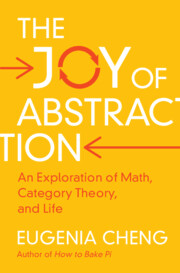Book contents
- Frontmatter
- Dedication
- Contents
- Prologue
- Part One Building up to Categories
- Interlude A Tour of Math
- Part Two Doing Category Theory
- 14 Isomorphisms
- 15 Monics and epics
- 16 Universal properties
- 17 Duality
- 18 Products and coproducts
- 19 Pullbacks and pushouts
- 20 Functors
- 21 Categories of categories
- 22 Natural transformations
- 23 Yoneda
- 24 Higher dimensions
- Epilogue Thinking categorically
- Appendices
- Glossary
- Further Reading
- Acknowledgements
- Index
16 - Universal properties
from Part Two - Doing Category Theory
Published online by Cambridge University Press: 13 October 2022
- Frontmatter
- Dedication
- Contents
- Prologue
- Part One Building up to Categories
- Interlude A Tour of Math
- Part Two Doing Category Theory
- 14 Isomorphisms
- 15 Monics and epics
- 16 Universal properties
- 17 Duality
- 18 Products and coproducts
- 19 Pullbacks and pushouts
- 20 Functors
- 21 Categories of categories
- 22 Natural transformations
- 23 Yoneda
- 24 Higher dimensions
- Epilogue Thinking categorically
- Appendices
- Glossary
- Further Reading
- Acknowledgements
- Index
Summary
In this chapter we formalize the idea of characterizing things by the role they play in context. First we discuss the difference between characterizing something by role and characterizing it by intrinsic characteristic. We consider “extremities” in some of the small drawable categories we’ve seen before, that is, the places where all arrows start or all arrows end. We make this more precise and more formal in the definition of initial objects. We explore what sort of categories do not have initial objects, including those with an infinite string of composable arrows, non-trivial loops, or disconnected parts. We prove that initial objects are unique up to unique isomorphism. We then define terminal objects and explore them analogously, mentioning the fact that this is the dual concept, although duality is discussed more fully in the next chapter. We then examine terminal and initial objects in some of the categories we’ve seen already: sets, posets, monoids, groups, and different categories of privilege. We observe that we can only describe universal properties in context, as something initial in one category may not be initial in another.
- Type
- Chapter
- Information
- The Joy of AbstractionAn Exploration of Math, Category Theory, and Life, pp. 206 - 225Publisher: Cambridge University PressPrint publication year: 2022



